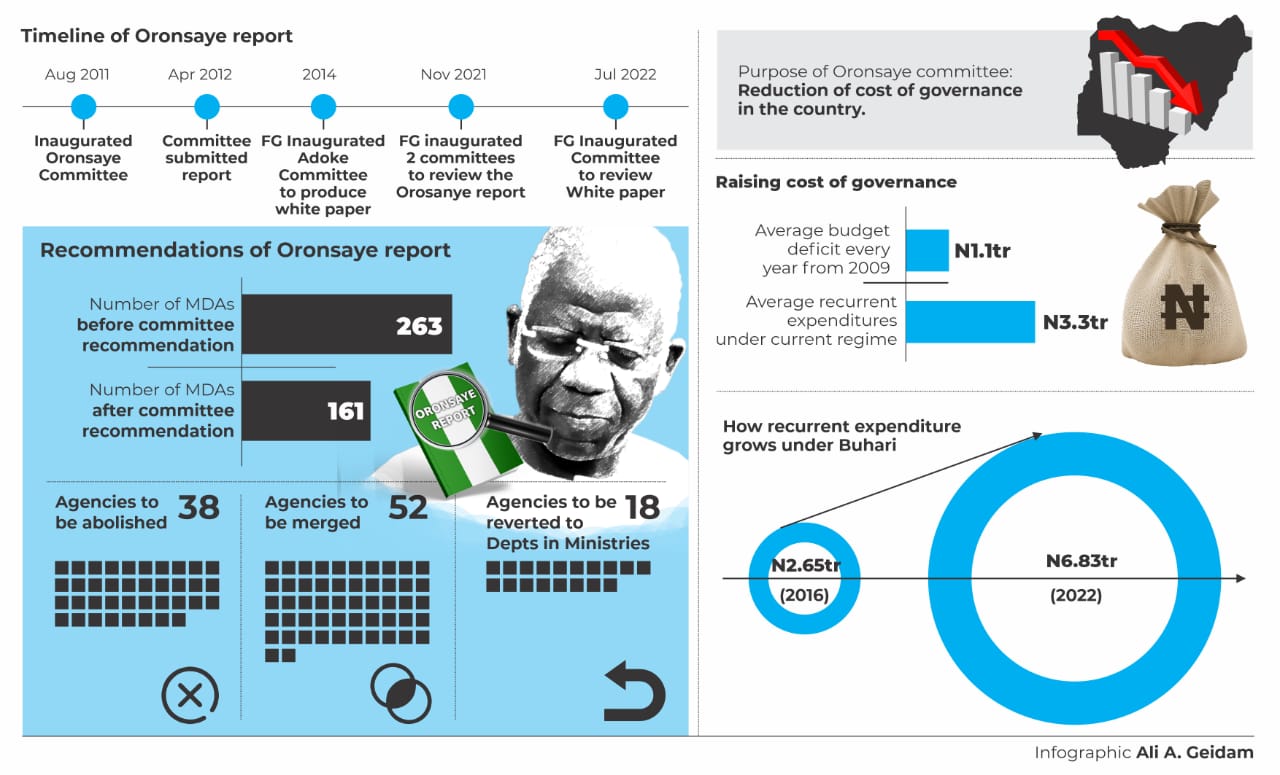Why FG may not implement Orosanye Report before 2023
With less than a year to the end of the President Muhammadu Buhari-led administration, there are indications that the report of the Steve Oronsaye Committee on the rationalisation of the federal civil service may not be implemented about 11 years after it was produced, Daily Trust reports. Despite constituting several committees to review and evolve […]

With less than a year to the end of the President Muhammadu Buhari-led administration, there are indications that the report of the Steve Oronsaye Committee on the rationalisation of the federal civil service may not be implemented about 11 years after it was produced, Daily Trust reports.
Despite constituting several committees to review and evolve strategies for its implementation, experts have, among other factors, blamed the absence of political will to implement the report.
- Senate c’ttee decries destruction of solar panels in Abuja
- 2023 census: NPC launches online recruitment portal in Nasarawa
Pundits say fear of political consequences of taking a decision that may likely see many people losing their jobs at a time of rising cost of living and with the general election around the corner would make it difficult for the government to go ahead with the plan.
Daily Trust reports that against the backdrop of the increasing cost of governance, the government in August 2011 inaugurated the Steve Oronsaye Committee on Rationalisation of Ministries, Departments and Agencies (MDAs) of government.
The committee, which submitted its report on April 16, 2012, recommended a reduction in the number of MDAs from 263 to 161 to reduce the cost of governance in the country.
However, the report of that committee was not implemented by the Jonathan administration, which passed it on to the Buhari administration in May 2015.
While inaugurating the committee, the Secretary to the Government of the Federation (SGF), Boss Mustapha, had expressed concern over the increasing cost of governance, especially with the revenue challenges in the country.
“The inability to implement the report of the Committee on Restructuring and Rationalisation of Federal Government Parastatals, Agencies and Commission is costing the government highly.
“This cost grows higher and the situation is further worsened by the fact that new agencies are being created,” he said. He, however, said for a number of reasons, most of which were anchored on political expediency, the white paper not only rejected a large number of the recommendations, it also merely noted an equally greater number of others.
A former Head of Service of the Federation, Mrs Ebele Okeke, who presented the report, said in carrying out the assignment, the committee took into consideration, the current economic challenges and the requirement for the government to utilise resources more efficiently in order to reduce the cost of governance.
‘Why the status quo may remain’
A former federal permanent secretary, Dr. Hakeem Baba-Ahmed, said one of the reasons why we haven’t seen much in the recommendations of the report is that there was a lot of interest in maintaining the status quo.
“For instance, legislators when they do oversight, they have something kept for them in these MDAs. Also, there are permanent secretaries who will resist the scrapping of agencies under their ministry,” he said.
Maintaining that due diligence was not done, especially taking cognisance of the implications of merging and scrapping a large number of agencies, Baba-Ahmed, who spoke on Trust TV’s flagship programme, Daily Politics, said: “I am certain the report has encountered resistance from the political level and the senior management of the public service because there are a lot of people that are against it and it is being sabotaged by people that are not supporting it.”
He said the collapse of the civil service is inevitable because it is virtually unprotected and it is vulnerable to the schemes and designs of the political class, adding that its rules are not protected and that if the political level wants to bridge or pollute it, it is easy for them.
Dr Baba-Ahmed maintained that a lot of interests are against the implementation of the report, adding that the recommendations if implemented would have little or no effect on Nigeria’s cost of governance.
“The fundamental thing in reforms is that you are addressing inefficiency: are you addressing cost and the quality of output? These things were ignored,” he said.
“The only thing the committee was rushing to do is just reduction of these agencies,” he said.
“You can’t give someone N50, 000 and expect them to perform while governors and lawmakers who do less take millions of naira which is wrong,” he also said.
The Director General of the Bureau of Public Service Reforms (BPSR), Mr Dasuku Arabi, however, said the government had already commenced implementation of the report.
“Certainly, because of changes in government and other things, the report was not implemented fully but that has not deterred BPSR from working as well as the federal government from implementing the report,” Arabi said.
We’ll implement White Paper—Buhari
President Muhammadu Buhari on August 19 reportedly said the public service remains the engine room of the government and should attract the ‘best and brightest’ that will fuel policies with fresh ideas.
While assuring that the white paper report will be implemented, after review, Buhari said: “I have directed that the Orosanye White Paper Report be subjected to immediate review to enable the government to take the most appropriate decision on its general recommendations.”
The president, who hosted the Central Working Committee of the Association of Senior Civil Servants of Nigeria (ASCSN) that visited him at the State House in Abuja, said: “I am aware that the review is about to be completed. While some may complain about the length of time it has taken thus far, the outcome of the various reviews would lead to some fundamental changes in the structure of our civil service, and as such it must be subjected to rigorous review and scrutiny before presentation and implementation.”
